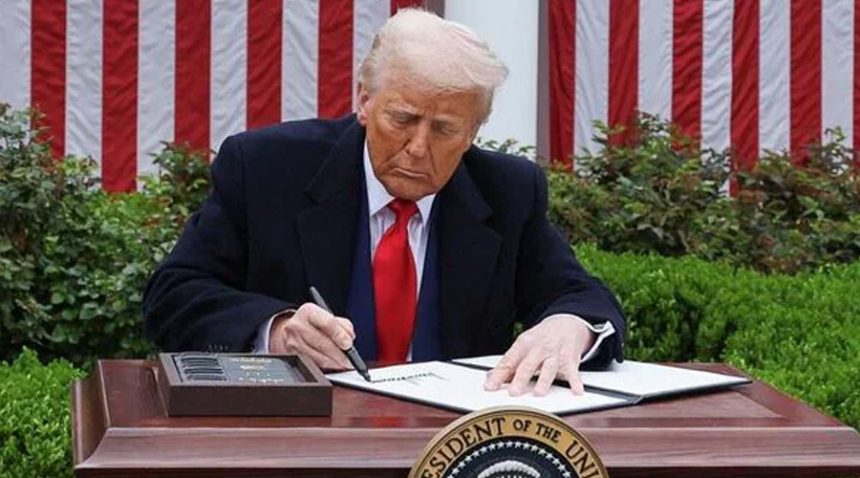Financial experts say pausing SIPs now could cost you more than just peace of mind!
US President Donald Trump’s tariffs are creating shockwaves worldwide, even starting a global market crash in 2025. Indian investors are also catching the heat. On April 7, 2025, the BSE Sensex dipped a whopping 2,226 points, one of its biggest single-day falls in recent times. This sudden decline has made retail investors question whether going on with SIP investment plans is a good idea or not.
Trump Tariffs Impact
Trump’s trade policy has resulted in a large number of sell-offs in stock exchanges globally, incurring heavy losses from Wall Street to Dalal Street. Asian stocks like Japan’s Nikkei 225 and Hong Kong’s Hang Seng fell drastically. Indian share markets, exposed heavily in export sectors like IT, pharma, and diamonds, also bore the brunt. The situation became worse with Foreign Institutional Investors (FIIs) withdrawing more than ₹9,000 crore (US$1 billion) from Indian equities within a single day. Thus, further pressuring an already volatile market.
Investor Panic: Are SIPs Still Worth It?
Market downturns tend to result in impulsive decision-making. The SIP data for February 2025 showed a 122% rise in discontinuations, highlighting growing fear among investors. Most believe that further investment could result in more losses. Experienced financial advisors, however, advise against jumping to conclusions over market fluctuations.
Why Continuing SIPs May Be the Smart Move
SIP investments come with many benefits despite the recent volatility:
Rupee Cost Averaging Benefit: SIPs automatically invest more units at lower prices, thus reducing the cost per unit. Slowly, this creates a sound base for better returns when markets recover.
Historical Trends Favor Patience: Previous downturns, including the 2008 crash and the COVID-19 plunge, show that SIPs that were never stopped eventually realized good profits. Investors who held on were usually better placed than the ones who withdrew early.
Power of Compounding: Compounding helps SIPs massively when they are made regularly. Stopping or even temporarily halting SIPs can cut long-term returns by 4-21% based on how long SIPs are stopped and what other investments are undertaken.
India’s Market Recovery Potential: India’s economy is well-protected from world trade when compared with export-dependent countries. This may mean that India’s market recovers more rapidly once global tensions are over.
Although everything has two sides and so do SIPs, this investment option is not devoid of risks especially as Trump tariffs continue to wreak havoc on the markets.
Risks of Continuing SIPs During Crises
Short-Term Losses: Investors may experience short-term falls in their portfolios due to stress, especially those who need liquidity.
Increased Volatility: While markets fluctuate, the timing of recoveries is hard to guess, and there is no degree of predictability.
Loss of Alternative Gains: Investors who go with SIPs may lose short-term gains on safer alternatives such as debt funds or gold, which do better during volatilities.
Effect on Short-Term Objectives: Short-term investors with monetary goals may not find it wise to maintain equity SIPs. Future market declines may compromise target dates.
Equity Over-Exposure: All-equity SIPs could result in excessive risk concentration. The absence of diversification leaves portfolios exposed.
Surviving the Crisis
Check how to navigate the above-mentioned risks carefully:
Diversify Your Portfolio: Add debt, hybrid funds, and even foreign investments to diversify.
Reassess Strategy: Regular review of SIPs and overall investment strategy can help ensure it is aligned with changing goals and risk tolerance.
Maintain Liquidity: Have an emergency fund to avoid redeeming investments when markets are down.
Final Thoughts
The current instability fuelled by Trump tariffs has unsettled markets and investors alike. Stopping SIPs in reaction, though, might not be the best plan. Instead discipline in investment, especially during uncertainty will yield better results. Rupee cost averaging, compounding, and the strong possibility of a market bounce back will advance the argument for maintaining current SIPs. Ultimately, remember, long-term wealth is created not by responding to each market fall, but by riding it out.





